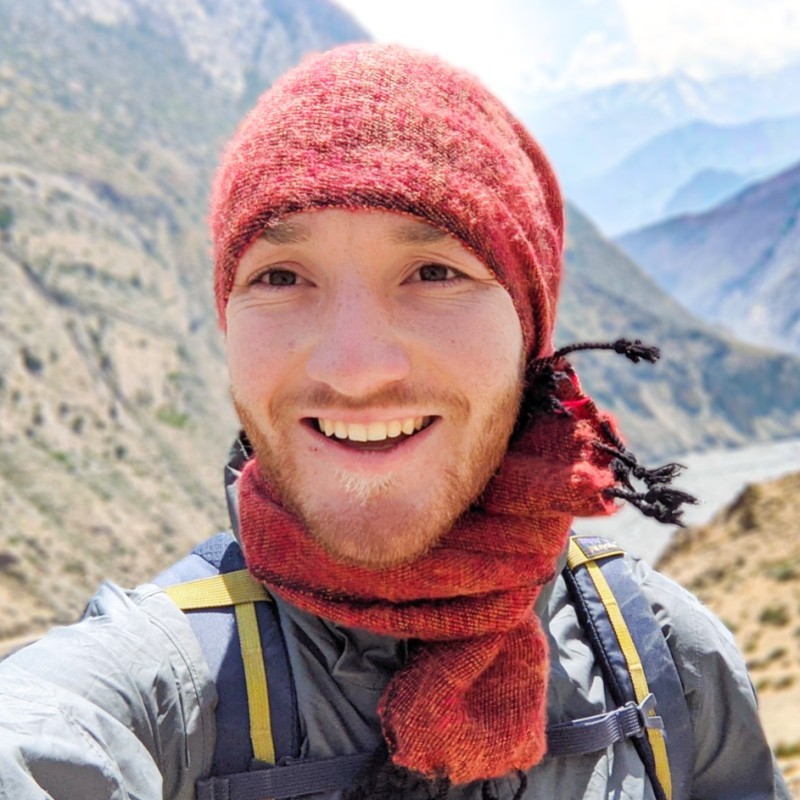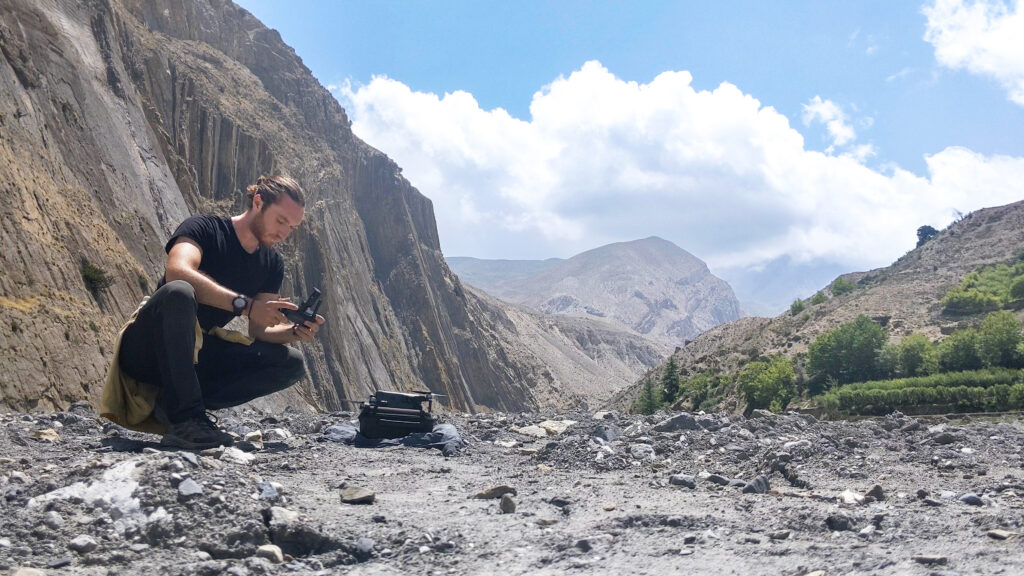SIT alum will document Nepal flood impacts as Alice Rowan Swanson Fellow
Publication Date: November 28, 2023 | Alumni, Fellowships, Research, SIT Study Abroad
Publication Location: Brattleboro, Vermont
Contact: Kate Casa | [email protected]
BRATTLEBORO, Vermont—School for International Training has named Ronan Wallace, a 2022 alumnus of SIT’s Tibetan and Himalayan Peoples program, as the newest Alice Rowan Swanson Fellow. Wallace graduated summa cum laude with departmental honors from Macalester College with a BA in computer science and a minor in data and cognitive science.

For his fellowship project, he plans to return to Nepal to document flooding impacts through 3D modeling and ethnographic interviewing in two communities threatened by Himalayan flooding, which is growing more acute each year due to the climate crisis. A lack of documentation makes it difficult for the communities to get the assistance they need.
In March through July 2024, Wallace plans to live in Lubra and Kagbeni, Tibetan villages in the remote and once-arid region of Mustang, where he will create new digital 3D models of flood damages, conduct oral interviews with community members, and film flooding during the monsoon season. “At the core of my project, I ask: ‘How can digital 3D models contextualized by local perspectives be used for swift communication of Himalayan climate-induced impacts?’”
In Mustang, Nepal, marginalized communities face drastic shifts in livelihood as flash flooding increases, “resulting in communal displacement, water insecurity, and cultural disruption across communities,” Wallace wrote in his application. "We need succinct documentation that supports communities in communicating local flood damages and conveying its cultural implications.”
Three-dimensional modeling is a low-cost, high-impact way to document climate-induced impacts, Wallace noted. By prioritizing local perspectives in contextualizing these 3D visualizations, his project “encourages communal voices to take center stage, spotlighting marginalized Himalayan communities struggling to adapt to anthropogenic climate impacts.”
He said his project may serve as a model for other impacted communities, and “demonstrate how we can empathetically contextualize data-based storytelling in a way that not only places communal voices ahead of our own, but also results in an effective resource for communal use.”
SIT Nepal Academic Director Isabelle Onians had high praise for Wallace’s proposal, based on the exemplary Independent Study Project he produced while on her program. In her recommendation to the fellowship committee, Onians said his project “is an inspiring example of how a single young person can make an enormous difference.”

“Community leaders in the valley of Lubra and Kagbeni and in the broader society of Mustang are requesting him to come and document the climate change they are undergoing,” she wrote.
Winters are warming and monsoon months are intensifying in Nepal’s remote Mustang region, leading to increased flash flooding in Lubra, one of the few villages in Nepal still fully practicing Bön, the indigenous religion of the Tibetan Plateau. As flooding increases, residual sediment is raising the elevation of the riverbed, and community members fear their village will be submerged within 10 years, Wallace reports. “Over eight centuries of culturally significant land and homes are slowly disappearing, and families fear their ancestral heritage will go with it.”
In the nearby Tibetan village Kagbeni, recent flooding washed away 29 houses and displaced more than 150 people, causing more than USD$12 million in damages, crippling the village’s agricultural livelihood and economy.
As calls for protective policies come into question, Wallace says a lack of documentation of these impacts will result in inadequate adaptation strategies and perpetuate limited relief funding.
Although there has been extensive photo documentation of glacial retreat in the Himalaya, Onians said the humanitarian aspect of Wallace’s project makes it unique because of his very personal commitment to both the content of the problem and to finding a solution, as well as to the means he is deploying.
During his semester abroad, Wallace formed deep professional and personal relationships with collaborators in his project site and in the wider region. His co-researcher, Yungdrung Tsewang Gurung, studies migration and climate change through collaborations with Yale University and the University of British Columbia, and the research team includes Sonam Lama, a research associate in sustainable urban planning and Hubert H. Humphrey Fellow at MIT, and Dane Carlson, a Fulbright Nepal alum and environmental design strategist at the United Nations Office for Project Services in Nepal.
“Given the robust connections I have formed during my prior fieldwork in Nepal, my training in both engineering and ethnography, and my experience conducting qualitative and quantitative research in multiple international contexts, I believe that I am fully equipped to carry out my proposed project," Wallace wrote. "The Alice Rowan Swanson Fellowship will allow me the time, space, and funds to continue my dream in applying engineering for humanitarian efforts.”
Wallace’s collaboration with Yungdrung Tsewang Gurung was published in the Nepali Times. Since his semester abroad, he has presented at five conferences in the U.S. and Europe and founded a a project at UC San Diego's Engineers for Exploration research group, where he leads undergraduate engineers. He also created a website with more information about his project.
Last fall, SIT submitted Wallace’s ISP work to The Forum on Education Abroad in the Academic Achievement Abroad award category. Wallace also presented a paper at the inaugural SIT Journal of Critical Global Issues round table in May and was invited to submit his manuscript for consideration for the first issue of the journal.
After he returns to the U.S., Wallace plans to pursue a PhD in computer engineering with applied research in environmental conservation and cultural preservation.
The Alice Rowan Swanson Fellowship was established in 2009 by the family of SIT Study Abroad Nicaragua ’06 alumna Alice Rowan Swanson as a living tribute to her life, her passion for bridging cultures and helping others, and the role that SIT Study Abroad played in her life. A 2007 Amherst College graduate, Alice was killed while riding her bike to work in 2008.
The fellowships are awarded twice annually to SIT Study Abroad and IHP alumni to return to their program country and pursue further development projects benefiting human rights in that region.
